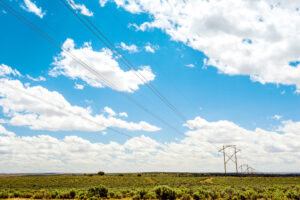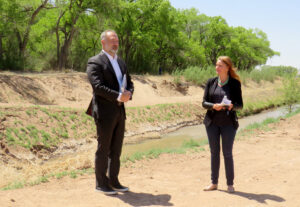Landmark NYC Climate Change Hazard Plan Bill Set for Approval After Ida ‘Wake-up Call’

New York City could soon get a wide-ranging, first-of-its-kind plan to protect and prepare all five boroughs for the effects of climate change — and not just on the coasts.
The City Council is slated to vote Thursday on a newly updated bill that would require the Mayor’s Office to create a citywide climate adaptation plan to evaluate risks that include storms, sea-level rise and possible wildfire — as well as extreme heat, wind and rain.
The devastation in the wake of Hurricane Ida last month helped resurrect the bill after years of calls by environmental advocates for a citywide plan to tackle myriad climate threats — including the kind of flooding wrought nearly a decade ago by Superstorm Sandy.
“Post-Sandy, we still don’t have a full citywide plan to make our communities more resilient to sea level rise and storm surge,” said Julie Tighe, president of the New York League of Conservation Voters. “It’s become much more evident over time, and highlighted in particular this summer. We need to be making sure we’re looking at the risk of inland flooding and urban heat, as we know that’s really a public health risk.”
The plan — due by Sept. 30, 2022 and to be updated every 10 years — would identify the neighborhoods most vulnerable to various climate hazards, with special attention paid to areas disproportionately burdened by pollution.
The goal: to help the city prioritize resilience and adaptation projects — both built infrastructure and nature-based strategies.
“None of these things are impacting all communities the same,” Tighe said. “As usual, unfortunately, disadvantaged communities are at greater vulnerability to those kinds of threats.”
‘Big Sweeping Policy Ideas’
When Councilmember Justin Brannan (D-Brooklyn) introduced the bill in 2019, it focused purely on the city’s 520-mile shoreline. That version called for the city to come up with a plan to protect coastal communities from sea-level rise and so-called sunny-day flooding, which occurs in low-lying areas when tides are high.
The bill had long stalled, with its last committee hearing held almost two years ago.
But in the aftermath of Hurricane Ida, which dumped more than 7 inches of rain in many parts of the city, momentum built, and the bill evolved.
Brannan called the deaths of 13 people killed in the city last month during the flooding caused by Ida “a wake-up call.”
“Out of these hurricanes, what came was the realization that the climate crisis we’ve been predicting has now arrived,” he said. “What we’ve wanted to do is really understand and appreciate that. In order to properly address this, it means sweating the small stuff and it means big sweeping policy ideas.”
The Council Committee on Resiliency and Waterfront will vote on the amended bill Thursday prior to the full Council’s vote. Brannan is confident the measure has the support it needs to pass.
Threats Are Connected
The aim of the plan required by the bill is to tie together all the efforts the city has undertaken to show the interconnected nature of the climate threats the city is facing, Brannan said — and to highlight solutions to best address multiple risks in tandem.
The city released a Stormwater Resiliency Plan in May, and the Department of City Planning is at work on a Comprehensive Waterfront Plan, due this year.
The Mayor’s Office of Climate Resiliency is also making a “Climate Adaptation Roadmap” to “consider the full range of climate hazards impacting New York City,” said spokesperson Phil Ortiz, who noted Mayor Bill de Blasio’s administration is supportive of Brannan’s bill.
Using science produced by the New York City Panel on Climate Change, that roadmap will lay out a citywide, long-term adaptation plan based on hazard analysis focusing on coastal storms, extreme rain and heat and sunny-day flooding. It will consider physical and social factors of risk, with an eye to the most vulnerable neighborhoods.
Should the bill pass, the Climate Adaptation Roadmap’s scope would expand to include the requirements therein, and the roadmap would be updated every decade. The Office of Climate Resiliency would also consult with several city agencies — from the Department of Buildings to the Department of Transportation — to create the plan.
“The bill is diverse in scope and scale to meet the risks we’re facing,” said Karen Imas, vice president of programs for the Waterfront Alliance, an advocacy group. “It’s trying to ensure systems are in place so communities can adapt and thrive in the face of climate hazards.”
A Roadmap for Next Mayor
The bill lacks teeth — or dedicated funding — to force the implementation of the plan’s recommendations — a point Brannan lamented.
“What’s mildly frustrating about this is that we’re just passing a bill that calls for a plan, not passing a bill that actually calls for any tangible action,” he said.
If the bill becomes law, it would codify resilience planning for every subsequent mayoral administration — which is important as de Blasio’s term ends this year, supporters of the measure say.
Brooklyn Borough President Eric Adams, the Democratic nominee for mayor who is de Blasio’s likely successor, recently unveiled his own vision for resiliency, which proposes action items in the short, medium, and long-term to prepare New York City for the worsening threats of climate change.
He proposed a single comprehensive city-wide resiliency plan that highlights needs particular to different neighborhoods.
Having a plan can position the city to invest in capital projects in the near- and long-term, Imas said. That’s of particular importance as the federal government hammers out a multi-trillion reconciliation bill or infrastructure bill that could result in an influx of funds to the city.
This article was originally posted on Landmark NYC Climate Change Hazard Plan Bill Set for Approval After Ida ‘Wake-up Call’







